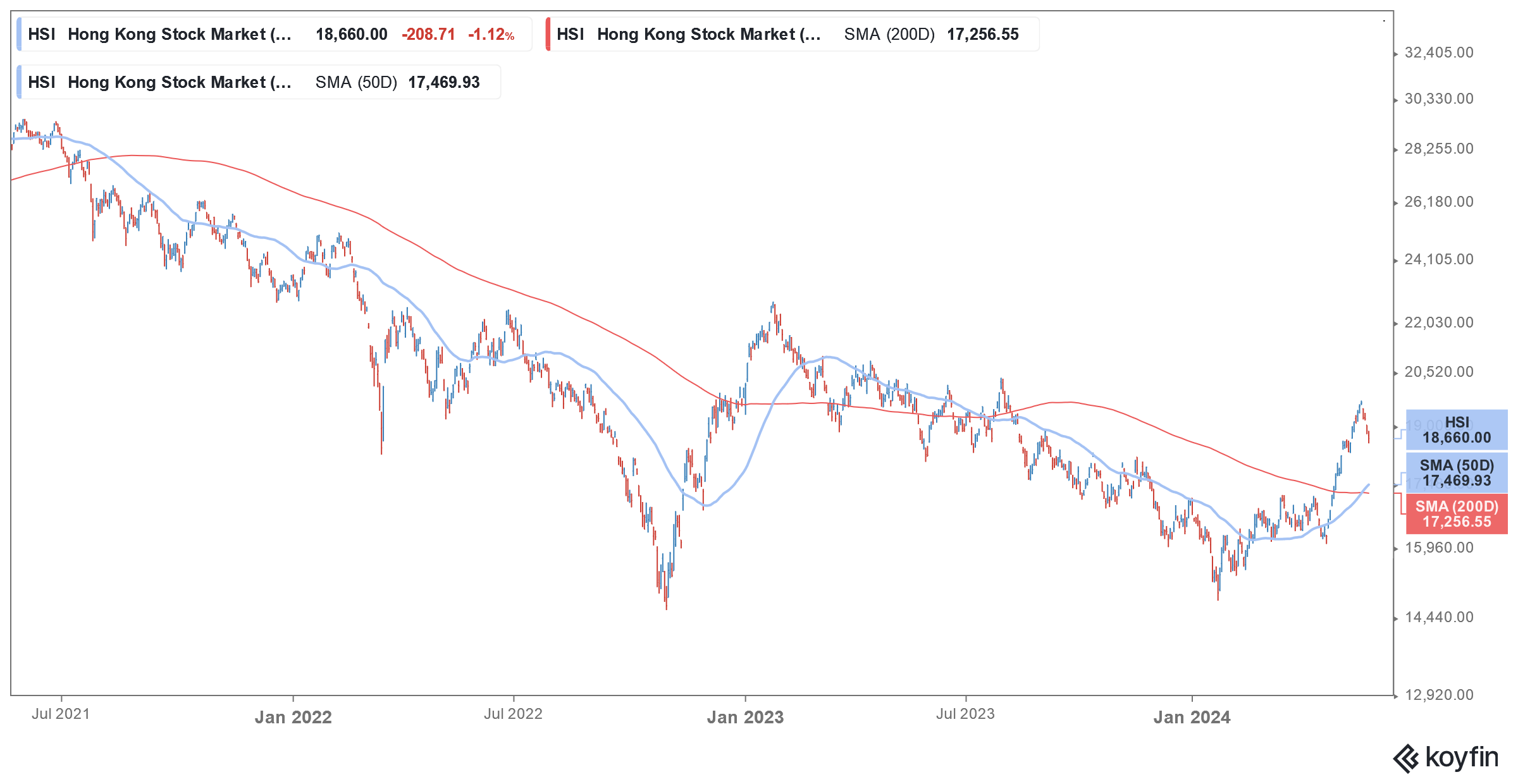Brokerages Turn Bullish on Chinese Stocks as Hang Seng Enters Bull Market
Please note that we are not authorised to provide any investment advice. The content on this page is for information purposes only.
Chinese stocks have underperformed global markets over the last decade and the Hang Seng index fell to multi-year lows earlier this year. However, they have since rebounded and the Hang Seng is now in a bull market after having risen over 20% from its lows. Several analysts have also turned bullish on Chinese stocks over the last couple of months amid their relative undervaluation compared to global stocks.
Wendy Liu, who is JPMorgan’s chief Asia and China equity strategist believes that Chinese stocks are “tilted in the positive direction.” While she believes that the rally in Chinese stocks would fizzle away in the short term, she is optimistic about a recovery in earnings this year as compared to 2023.
According to Liu, “Earnings drive share performance. And investors when they see earnings growth, they’ll be interested.” She expects China’s CSI300 equity to hit 3,900 by the end of the year and said that Chinese stocks are “among the cheapest” in the Asia Pacific region.
The Valuations of Chinese Stocks Have Plummeted
To be sure, the valuations of Chinese markets have plummeted over the last few years. Firstly, China’s tech crackdown spooked investors and many US fund managers now find Chinese stocks “uninvestable” Cathie Wood of ARK Invest is among those who sold off Chinese stocks in 2021 amid the tech crackdown.
While the country has since sounded a more reconciliatory tone towards large tech companies, for many investors Chinese tech stocks are now uninvestable considering the policy uncertainty.
Rising tensions between the US and China are not helping matters either and last week, US President Joe Biden increased tariffs on several Chinese goods. His predecessor Donald Trump had anyways imposed massive tariffs on most imports from China.
Then we have the structural slowdown in China which has taken a toll on market sentiments. While Chinese stocks were once quite popular among international investors as the company brought both growth and stability to the table, things have since changed.
The pessimism is reflected in the valuations of Chinese stocks and they trade at a significant discount to their global peers.
Analysts Turn Bullish on China
The valuation gap between Chinese and US stocks has widened after Hong Kong shares closed in the red for four consecutive years while US stocks gained in three of these years. However, some analysts are now getting bullish on Chinese stocks. In a recent note BNP Paribas said, “Looking ahead, we believe the broader index may gradually rise further over the next one to two months, as investors anticipate the potential structural reform measures to be introduced at the long-awaited third plenum.”
The brokerage was referring to the Central Committee of China’s Communist Party’s Plenum in July where it is expected to announce structural reforms in a bid to shore up the economy.
While Daiwa believes that the rally in Chinese stocks was driven by fund flows rather than fundamentals, it nonetheless sees the return of foreign capital to the world’s second-largest economy a positive sign.
In its note, it said, “While China stocks do not appear ready for a multi-year rally, the significant outperformance of US and Japan equities over A-share and Hong Kong ones over the past two years should narrow in 2024, in our view.”
Many Hedge Funds Bought Chinese Stocks in Q1
The recently released 13Fs show that many hedge funds have increased their stake in Alibaba and other Chinese tech stocks. The move comes amid the slight recovery in this beaten-down asset class which fell out with several foreign investors, especially in the US.
Billionaire investor David Tepper’s hedge fund Appaloosa Management, Saudi Arabia’s Public Investment Fund (PIF), and Michael Burry’s Scion Asset Management are some of the funds that increased their stake in Alibaba in Q1.
Alibaba is now the biggest holding for Appaloosa Management. Tepper also increased his fund’s stake in PDD Holdings and Baidu and along with Alibaba they make for three of the top 10 holdings.
Michael Burry Increased Stake in Alibaba
Burry of The Big Short fame also increased his stake in Chinese stocks. Its top holding at the end of Q1 was JD.com followed by Alibaba where the fund held around $9 million worth of shares. In 2023, Burry had sold all the Chinese shares that he was holding but now seems to be warming up again.
Similarly, PIF which is Saudi Arabia’s sovereign wealth fund increased its stake in Alibaba by 11% in Q1 making it among the biggest additions to the cash-rich fund in the quarter. Notably, PIF and its affiliates have been buying stakes in several overseas companies. The fund holds a stake in leading US companies like Uber and is the biggest shareholder of electric vehicle startup Lucid Motors.






